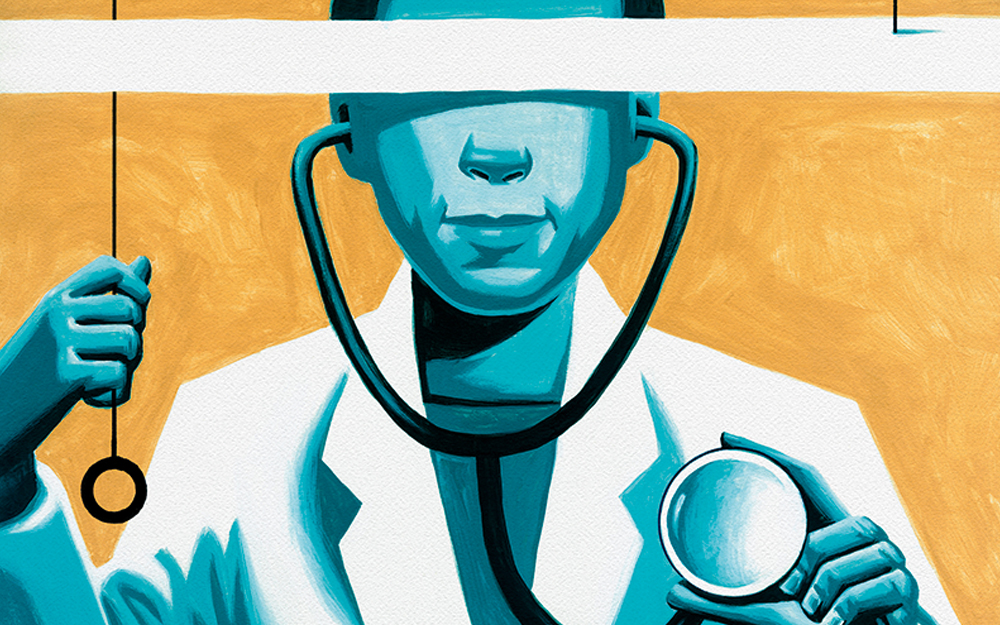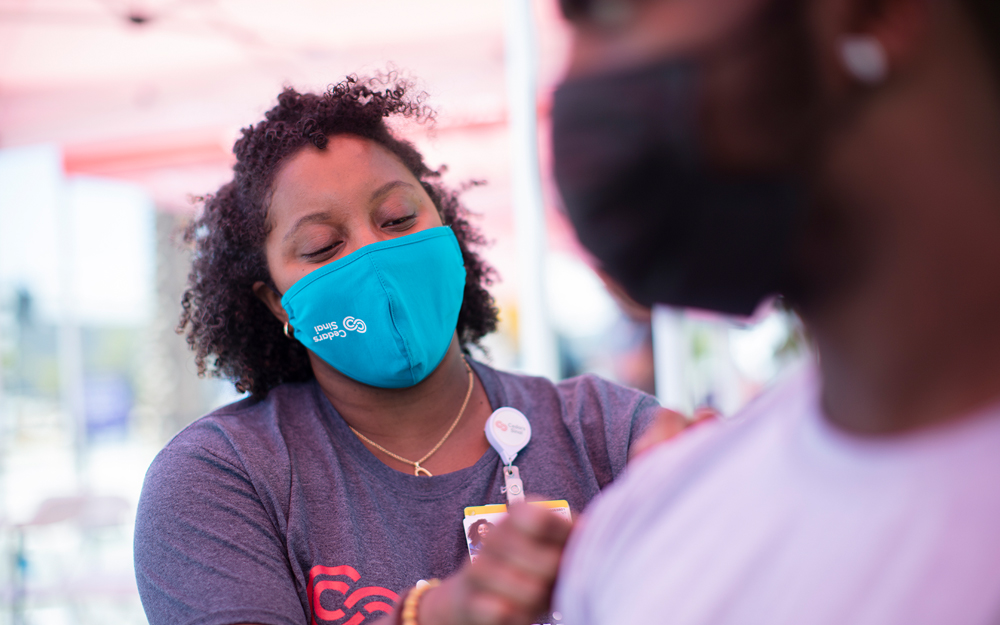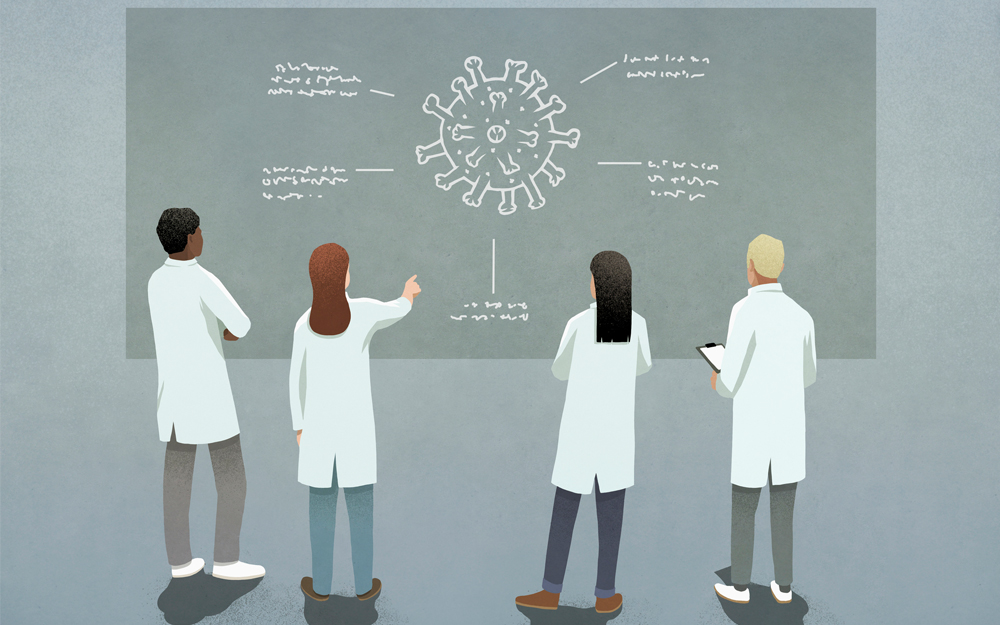What Did COVID-19 Teach Us for the Next Pandemic?
Date
June 8, 2022
Credits

Date
June 8, 2022
Credits
Medical providers featured in this article

In Brief
{{cta-block}}
When COVID-19 brought the world to a standstill, healthcare workers dug into their roles and networked to pioneer lasting innovations.
Through the creation of a Cedars-Sinai COVID-19 Research Task Force and partnerships with other health institutions, physicians and researchers collaborated to understand the pandemic, even as information—and the virus itself—rapidly evolved. Investigators across specialties initiated more than 100 studies focused on COVID-19, while physicians and supply-chain teams raced to meet the crushing demand.
Such teamwork was at the root of a fundamental transformation in medicine. Lessons learned laid the foundation for how effectively we will respond to the next pandemic, which could hit sooner than feared: Global health-risk modeling estimates there is about a 50% chance that a new viral or bacterial outbreak on the same scale as the current pandemic will occur in the next 25 years.
"Everyone was forced to invest so much effort, time and material into this pandemic that we’ve learned a lot that can be useful in future pandemics," says Dr. Peter Chen, director of Pulmonology and Critical Care Medicine and the Medallion Chair in Molecular Medicine at Cedars-Sinai.
Treatments and Vaccines Take a Quantum Leap
Less than a year after the identification of SARS-CoV-2, the virus that causes COVID-19, groundbreaking studies led to Food and Drug Administration approval of remdesivir, monoclonal antibodies and oral antivirals to treat the disease.
Multisite clinical trials gleaned information in real time, Dr. Chen says, and taught scientists much about treating viral infections. Through collective study, we learned that drugs originally developed for other illnesses, including Ebola, could be recalibrated to fight viruses in the same family as COVID-19, such as SARS and MERS.
"It shows what our machinery can do when we really put everything into it," Dr. Chen says.
Pandemic research also led to the creation of the first-ever coronavirus vaccines. Two of the approved vaccines trigger an immune response by using messenger RNA (mRNA) to teach cells how to produce harmless spike proteins that mimic those that open cells to SARS-CoV-2. Researchers have been studying mRNA vaccines for decades, but COVID-19 vaccines are the first to be introduced to the public.
"Now that we have the method down and mechanisms to improve it, we can very quickly tweak the vaccine to work against the next virus," Dr. Chen says.
Infectious Disease Can Affect Genders Differently
Dr. Susan Cheng, director of Public Health Research and the Erika J. Glazer Chair in Women’s Cardiovascular Health and Population Science, leads Cedars-Sinai studies on the impact of COVID-19 on diverse populations. Having established the multi-hospital Coronavirus Risk Associations and Longitudinal Evaluation (CORALE) study network, her teams discovered gender differences so profound they could not be "wiped away with the strongest eraser," Dr. Cheng says.
Even after adjusting for age, hypertension, obesity, diabetes and other risk factors, the researchers found that men are more vulnerable to COVID-19 than women and exhibit a more exaggerated immune-inflammatory response.
"This is the tip of many icebergs in terms of helping us to better understand intrinsic biological sex differences in health and disease," Dr. Cheng says. "We are going to have to keep thinking about how some diseases present very differently in males versus females."
Outbreaks Take Advantage of Existing Structural Inequities
Dr. Cheng also examined the toll of COVID-19 on minorities, who have borne the brunt of infections, hospitalizations and deaths during the pandemic. Her team found that Black and Latino healthcare workers were more likely to have previously had a SARS-CoV-2 infection than their counterparts and were more frequently exposed in the community, not at work.
The role of housing is underestimated, Dr. Cheng says, because many vulnerable populations are more likely to live in multi-family units, which creates settings for the virus to spread more rapidly among the most at risk.
High-Quality Communication Is Key
Ever-shifting pandemic guidelines caused some public confusion and distrust. Explaining the difference between high-quality and low-quality data was a crucial challenge for public health officials, says Dr. Jonathan Grein, director of Hospital Epidemiology at Cedars-Sinai.
Medical professionals should clearly communicate what emerging, often-conflicting studies mean, and explain study methodologies and limitations, Dr. Grein says. For example, early findings on the protective value of masks relied on specific laboratory circumstances that were challenging to apply to the real world.
Later evidence building the case for masks was derived from larger studies and analyses that showed their effectiveness in communities and settings with high SARS-CoV-2 spread and among people with asymptomatic or presymptomatic infections. Strengthening public confidence in science could ensure better adherence to vital safety recommendations in a future pandemic.
Genetic Research Into New Bugs Should Be a Priority
Conducting research during a pandemic felt like "building the boat while sailing," says Dr. Moshe Arditi, executive vice chair for research in the Department of Pediatrics, director of the Division of Pediatric Infectious Diseases, and the GUESS?/Fashion Industries Guild Chair in Community Child Health.
Dr. Arditi’s exploration of a COVID-19-linked pediatric inflammatory syndrome, similar to toxic shock, uncovered viral molecules that induce the condition. He also discovered biomarkers that reveal potential disease genetic predispositions and predict severity of the disease. Understanding who might develop serious virus complications could ideally enable providers to make better care decisions.
Dr. Arditi hopes that elucidating specific viral molecules and biomarkers produced by COVID-19 patients will encourage greater focus and investment toward understanding emerging pathogens—before the next pandemic strikes.






